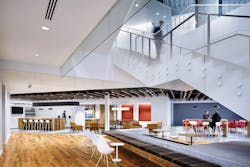Race for talent drives office designs
By John Caulfield, Senior Editor
Last April, Dairy Farmers of America moved into a new 110,000-sf headquarters in Kansas City, Kan., that has only nine traditional offices, versus more than 175 offices in its old headquarters. Meeting rooms and workstations can be rearranged easily to accommodate current needs and future growth. The new headquarters is rich in amenities, including a fire pit, outdoor conference rooms, and basketball and bocce courts.
Organizations like the DFA are using their facilities to jockey for position in the race for the 80 million or so Millennials who are entering the workforce.
HOK, which designed DFA’s headquarters, is seeing the “slow death of the open plan” and the evolution of activity-based workspaces into more collaborative neighborhood-based environments, says Tom Polucci, AIA, IIDA, LEED GA, Firmwide Director of Interiors with HOK.
State-of-the-art offices also blur the boundaries between work, life, and play, says Lise Newman, AIA, Director of SmithGroupJJR’s Workplace Practice. For a global technology client, her firm is designing a workplace that “reduces friction” for workers by incorporating full-service dining, micro-kitchens, libraries, a two-story fitness center, personal health clinics, laundry and dry cleaning services, and a quiet zone (no smartphones, please!) where employees can decompress.
Kelly Farrell, AIA, NCARB, LEED AP BD+C, EVP and Global Practice Group Leader for Workplace with CallisonRTKL, says authenticity is the current byword.
For American Greetings, her firm designed the greeting-card supplier’s Creative Studios, which opened last September. Located on 13.5 acres in Westlake, Ohio, the 660,000-sf space was designed to encourage collaboration. American Greetings’ 1,300 employees were invited to participate in the selection of furniture, upholstery fabrics, and light fixtures. The third floor features a courtyard with heated and covered sidewalks, landscaped seating areas, and BBQ grills. There’s a full-service cafeteria, a 10,000-volume reference library, a post office, a dry-cleaning drop-off, and a company store stocked with greeting cards, paper products, and collectibles.
Another important amenity in new and renovated offices is the IT infrastructure, “particularly with regard to technology and telecommunication,” says Goettsch Partners’ Matthew Larson, Associate AIA.
But HOK’s Polucci thinks companies need to be careful not to disenfranchise older employees by “overstimulating” workplaces with technology. CallisonRTKL’s Farrell says his firm directs its clients away from “gizmos and gadgets” and toward technology that enables employee interaction and enhances productivity.
Technology can also serve a company’s marketing and recruitment purposes. The reception area at a recent HOK office project, Teach for America’s 120,000-sf headquarters in New York, has a video wall where guests can view employees discussing their work.
Helping grads ease into the workplace
So much of what’s new in office design these days is in place to attract the next generation of professionals.
“Employers, especially the multinationals, are positioning themselves closer to where the talent is rather than trying to attract the talent to them,” says Farrell. Even a suburban office building like the CallisonRTKL-designed 4040 Wilson in Arlington, Va., is part of a master plan that mixes commercial, multifamily residential, and retail to create an urban-like setting.
Two recent Goettsch office towers—the 54-story 150 North Riverside, which opened in Chicago in April, and the 46-story Park Tower at Transbury, under construction in San Francisco—are squeezed onto absurdly narrow lots, evidence that developers are leaving no urban stone unturned to be closer to where young workers prefer to live.
However, a recent white paper by AECOM and furniture supplier Krueger International suggests that many employers could be doing more in their office designs to help young employees transition from college to the workplace.
The survey found that only 16% of the companies interviewed offer workspaces that respond to the preferences of freshly minted workers. Only 5% consider attributes of collegiate design in their office environments.
ALSO SEE: BD+C Giants 300 office rankings
Top 110 office architecture firms
Top 60 office engineering firms
Top 105 office construction firms
Corporate ‘regeneration’ spurring projects
With office construction booming lately, AEC firms say they’re looking for clients that want to go beyond the norm. “We evaluate projects based on a client’s tolerance to stretch their comfort zones and willingness to invest in a robust internal team,” says SmithGroupJJR’s Newman.
Most of the sources contacted for this report expect the office sector to remain vibrant for at least the next few years.
But there are some caveats. Goettsch Partners’ Larson notes that speculative projects only move forward when there’s a hefty anchor tenant attached. That was the case with his firm’s new 51-story 110 North Wacker Drive project in Chicago, where Bank of America in May agreed to lease nearly 500,000 sf for 2,000 employees.
HOK’s Polucci says that “much of what is happening in the U.S. today is corporate regeneration,” and that businesses are seeking better use of their existing building portfolios to accommodate trends and changes in the workplace.
“All of these changes mean there are new paths to be paved,” says Polucci.
